
The fact is, companies are transitioning from rigid travel policies to flexible business travel management, utilising in-house teams, travel management companies, and employee autonomy to navigate today’s complex travel landscape. However, this shift towards flexibility introduces new challenges, necessitating innovative solutions.
To address these challenges, businesses are embracing technology, including mobile apps and AI-driven solutions to streamline requests and processes, optimise costs, and enhance the overall booking and travel experience. The “Business Travel Insights 2024” report by Aviation Business Middle East and WegoPro provides valuable insights for travel managers, business leaders, and frequent travellers to optimise their travel processes, efficiency, and costs.
Current booking processes
Corporate travel management is split between outsourcing to specialised companies (36.84%) and relying on in-house teams (31.58%). Top concerns include controlling costs and tracking expenses (36.84%), ensuring policy compliance, and managing booking changes. Traditional methods prevail in travel policy enforcement and expense management, with manual approval processes (42.11%) and receipt-based reimbursement (57.89%) being common practices.
Despite these traditional approaches, respondents recognise the potential benefits of advanced technology to enhance efficiency. Key areas for improvement include integration with expense platforms, real-time updates, and AI-driven personalisation.
Shifting trends
According the report, this year has seen business travel become increasingly technology-driven with AI-powered tools, mobile apps, and real-time updates transforming the planning, management, and execution of trips. Key trends include AI-driven personalisation, mobile apps for booking and management, and flexible travel policies to accommodate last-minute changes.
CEO and Co-Founder of WegoPro, Prashant Kirtane, said as the industry evolves, companies that prioritise technology adoption, flexibility, and sustainability will thrive. As such, he stressed that WegoPro is committed to delivering cutting-edge solutions that streamline operations, reduce costs, and improving the corporate travel experience.
The study
The survey explored critical topics such as travel processes, cost management challenges, travel policy effectiveness, and traveller expectations; and analysed technology’s role in streamlining travel management. It also provided actionable insights and data-backed findings to help businesses refine their travel strategies, improve efficiency, tourism growth, and maintain control while also ensuring an optimal travel experience for their staff. Key findings highlight the importance of cost optimisation, policy compliance, and technology adoption.
Booking process and key challenges
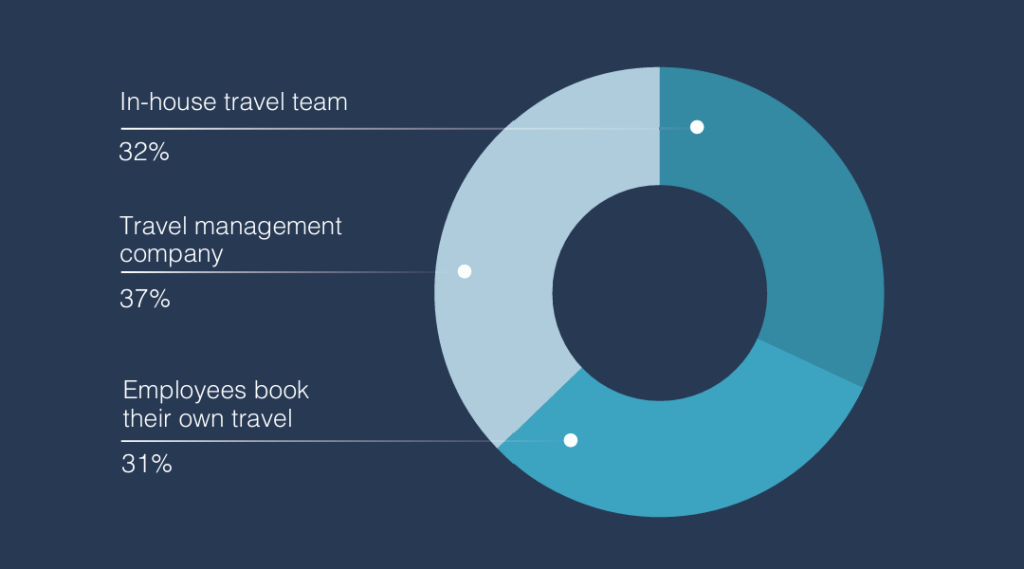
Business travel arrangements are shifting, with companies adopting diverse approaches. 37% partner with travel management companies, 32% use internal teams, and 31% allow employees to book their own travel, prioritising flexibility, convenience, and simplicity. However, this flexibility introduces complexity in managing changes and expenses.
Key challenges include handling booking changes (37%), tracking travel expenses (37%), streamlining approval workflows (32%), and controlling travel costs (26%). Furthermore, 11% struggle with policy compliance, and 42% lack a formal travel policy, indicating governance gaps and potential risks. Enforcement methods vary, with 37% relying on manual approvals and 21% using automation, highlighting the need for more effective travel management solutions to balance flexibility with financial control and policy adherence.
Managing, tracking and reporting travel expenses
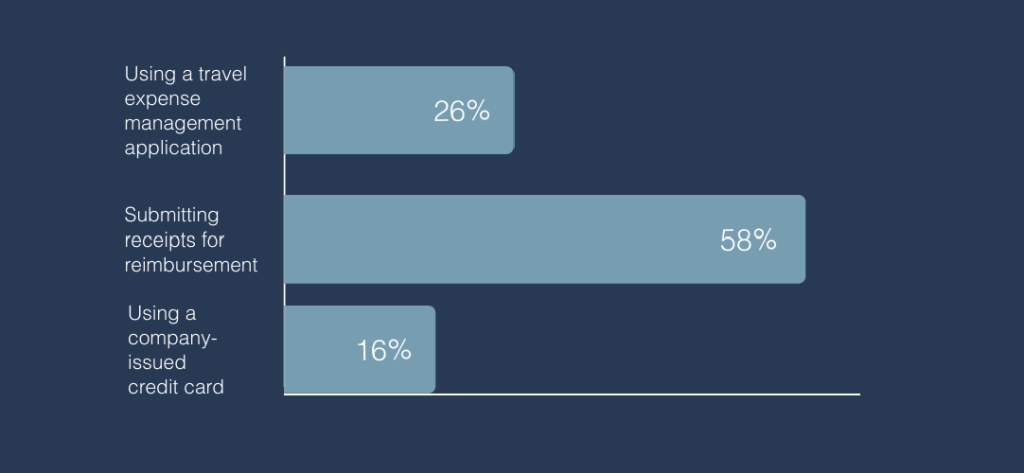
Effective travel expense management remains a priority for businesses, with a divide between traditional and modern methods. Currently, 58% of companies use traditional reimbursement models, where employees submit receipts after trips, while 26% have adopted digital travel expense management applications. Only 16% utilise company-issued credit cards. Manual expense tracking is still the go-to, with 47% relying on receipt tracking and 26% using spreadsheets, although 32% have adopted digital expense management software. As such, expense management remains a significant challenge, with 56% citing timely receipt submission as their top concern, followed by delays in reimbursement (39%) and difficulties monitoring overspending (33%).
Preferred providers including airlines
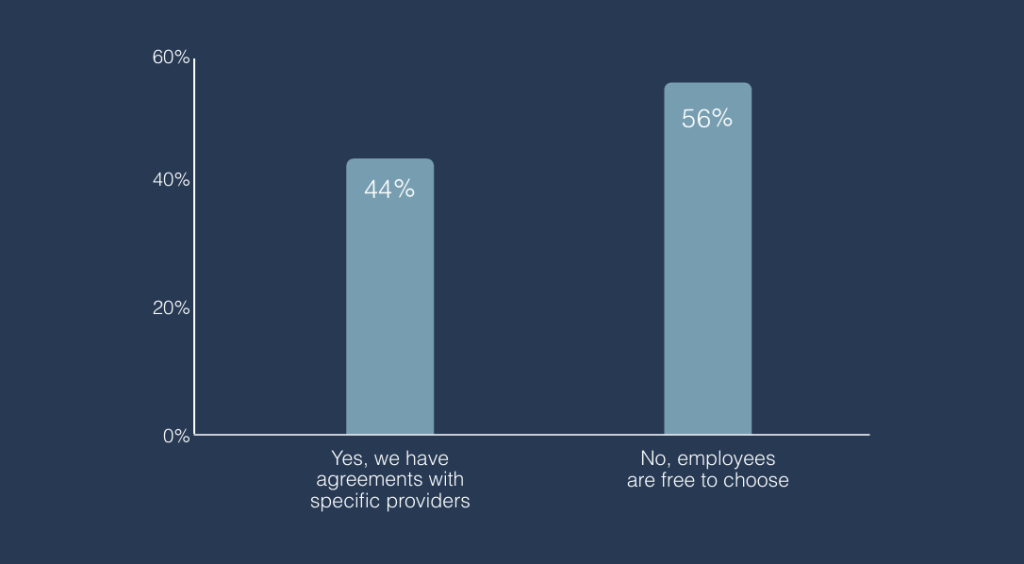
It appears that corporate travel policies prioritise a balance between cost savings and flexibility. While 44% of companies partner with specific airlines, hotels, and car rentals for discounts, 56% allow employees to choose their preferred providers, indicating individual needs now outweigh traditional cost-saving measures. Costs, however, remains the primary deciding factor in airline selection, with 94% prioritising budget optimisation over employee comfort (17%) and loyalty programs (11%).
Reflecting this cost-conscious approach, economy class is the default for corporate travel, but companies offer tiered perks. 22% upgrade select employees to premium economy or business class, and 11% reserve first-class travel for senior executives. This balances cost control with rewards for high-ranking staff, showing companies prioritise financial prudence while providing convenience and prestige for top executives, underscoring the importance of strategic travel management in today’s corporate landscape.
Read more: Luxury travel: The secret to business success
Advanced booking and changes
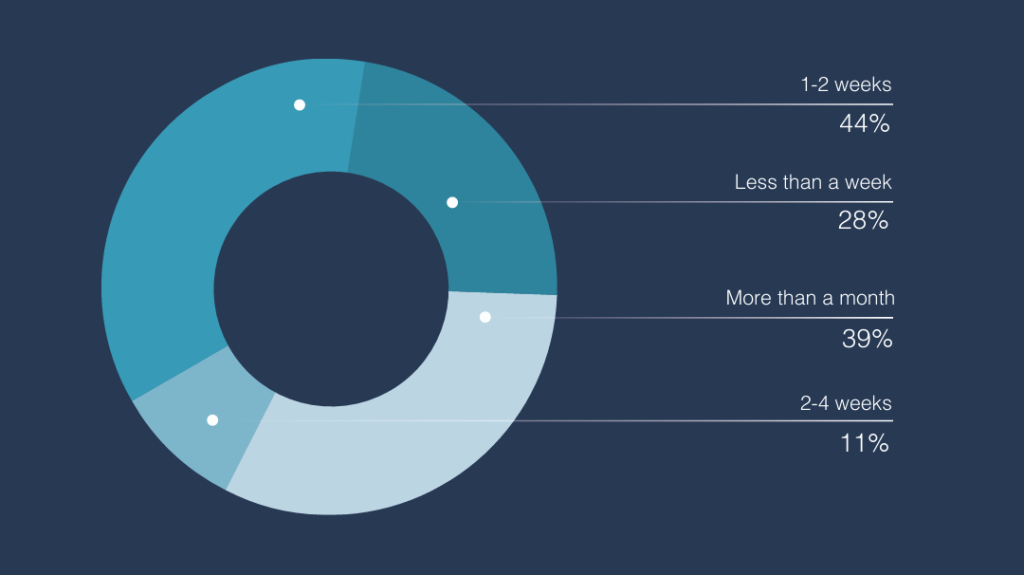
Business trip planning timelines vary significantly among companies. 44% per cent book travel 1-2 weeks in advance to balance flexibility and competitive rates, while 40% plan more than a month ahead to leverage early-booking discounts. In contrast, 28% book less than a week in advance, often driven by urgent business needs.
Most business travel plans remain relatively stable once finalised, with changes required about a quarter to half of the time. 50% of companies report modifications 25-50% of the time, while rare changes occur less than 25% of the time for 44% of respondents. When last-minute changes are necessary, 44% of organisations rely on employees to handle arrangements, while 28% use travel management companies, and 22% utilise flexible booking options. This highlights the need for effective travel management strategies that balance flexibility and cost optimisation.
Corporate travel management
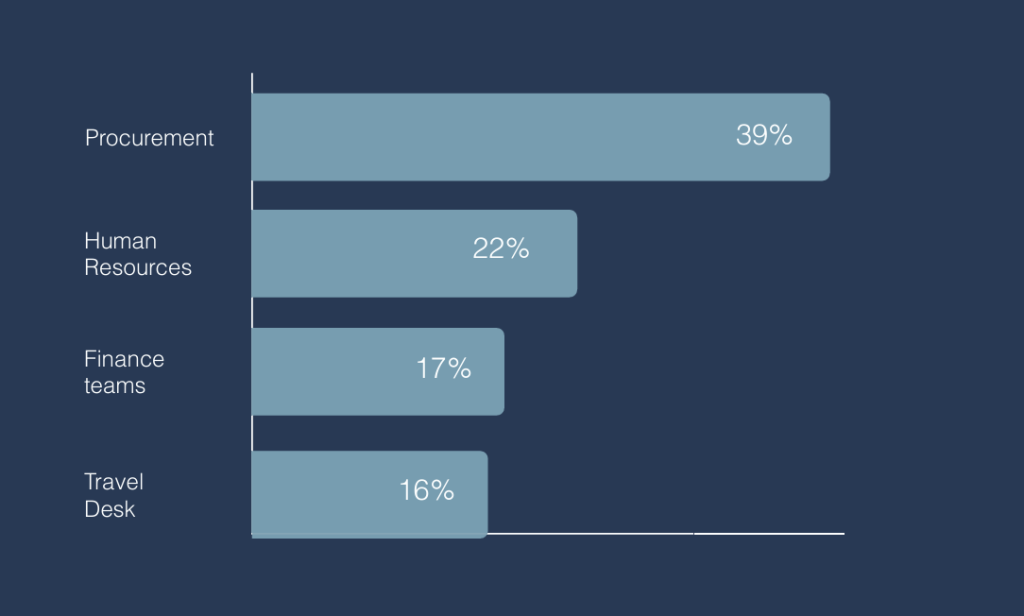
Corporate travel management responsibilities are distributed across departments, with procurement teams leading at 39% of companies, followed by human resources (22%), finance teams (17%), and dedicated travel desks (16%). This dispersion highlights the complexity of corporate travel management and the need for cross-departmental collaboration.
Satisfaction with corporate travel and expense management processes is lukewarm, with only 11% expressing satisfaction. To improve, respondents prioritised mobile applications (56%), AI-driven personalisation (50%), and integrated expense management systems (44%). Key features include integration with expense systems (44%), real-time updates (39%), and dynamic tools to keep travellers informed.
WegoPro case studies: Oppotunities for improvement
In the report, WegoPro shared a couple of case studies they helped to enhane the booking processes of two companies: Funding Societies and Transcelestial.
Funding Societies, a peer-to-peer lending platform, faced operational challenges due to manual expense management processes, leading to workflow bottlenecks, delays, and hidden costs. To address these issues, WegoPro offered advanced tools, including automated data syncing, real-time tracking, and easy receipt submission via mobile applications, streamlining expense management and improving accuracy, visibility, and employee satisfaction.
Benefits of the implemented tools resulted in reduced turnaround time, increased productivity, cost savings, minimised human error, and compliance with policies and regulations. The platform’s simplicity and transparency also enhanced the employee experience, reducing the time and effort required to submit expense claims and allowing for on-the-go approvals.
In another case, Transcelestial Technologies also struggled with manual travel and expense management processes, which led to inefficiencies, inflated costs, and frustrated employees. The company lacked visibility into travel spending, had issues with policy compliance, and faced delays with reimbursements.
To overcome these issues, WegoPro implemented tools that reduced administrative tasks by two-thirds, which in turn increased productivity. Automated booking and expense management processes streamlined workflows, ensuring policy compliance and minimised unauthorised spending. The platform’s analytics and integration with Xero enabled data-driven decisions, which led to a 30% reduction in travel costs. Importantly, employee satisfaction improved thanks to the user-friendly self-service portal and intuitive expense management process.
Read more: Amadeus says generative AI is key to travel industry growth



